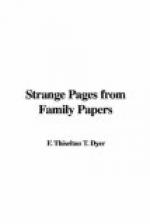In a still more striking way this spirit of persecution incurred its own condemnation. In the 17th century, Francis Howgill, a noted Quaker, travelled about the South of England preaching, which at Bristol was the cause of serious rioting. On returning to his own neighbourhood, he was summoned to appear before the justices who were holding a court in a tavern at Kendal, and, on his refusing to take the oath of allegiance, he was imprisoned in Appleby Gaol. In due time, the judges of assizes tendered the same oath, but with the like result, and evidently wishing to show him some consideration offered to release him from custody if he would give a bond for his good behaviour in the interim, which likewise declining to do, he was recommitted to prison. In the course of his imprisonment, however, a curious incident happened, which gave rise to the present narrative. Having been permitted by the magistrates to go home to Grayrigg for a few days on private affairs, he took the opportunity of calling on a justice of the name of Duckett, residing at Grayrigg Hall, who was not only a great persecutor of the Quakers but was one of the magistrates who had committed him to prison. As might be imagined, Justice Duckett was not a little surprised at seeing Howgill, and said to him, “What is your wish now, Francis? I thought you had been in Appleby Gaol.”
Howgill, keenly resenting the magistrate’s behaviour, promptly replied, “No, I am not, but I am come with a message from the Lord. Thou hast persecuted the Lord’s people, but His hand is now against thee, and He will send a blast upon all that thou hast, and thy name shall rot out of the earth, and this thy dwelling shall become desolate, and a habitation for owls and jackdaws.” When Howgill had delivered his message, the magistrate seems to have been somewhat disconcerted, and said, “Francis, are you in earnest?” But Howgill only added, “Yes, I am in earnest, it is the word of the Lord to thee, and there are many living now who will see it.”




